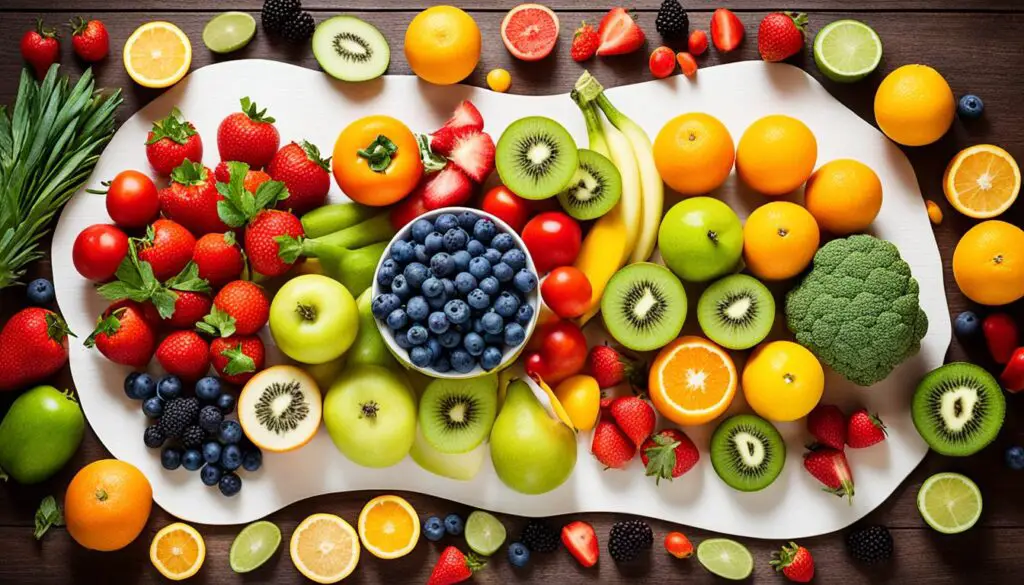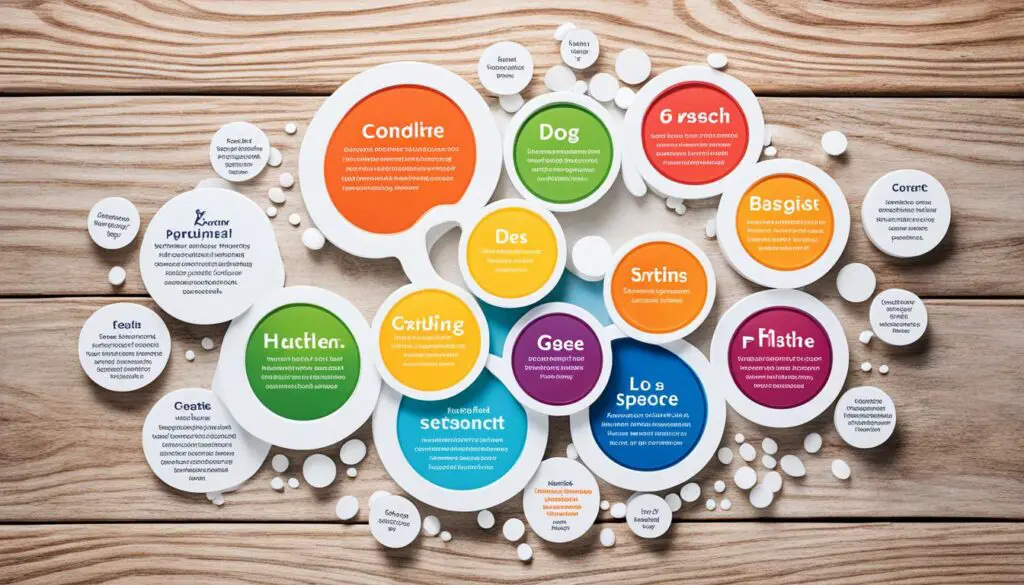I’ve seen the power of a good diet on pets’ lives. Consulting a vet on food choice is key. They’ll consider your pet’s age, breed, and health needs. Understanding what your pet requires nutritionally ensures they’re happy and healthy.
Searching for the right food means checking labels. Pick foods with quality proteins, grains, and veggies. Stay away from stuff with artificial junk. It could harm your pet over time.
Your pet’s age and habits help pick the meal type. Choices include dry kibble, canned, raw, or freeze-dried. A look for the AAFCO label means it meets recognized nutrition standards.
Keep an eye on your pet’s weight and general health. Adjust their food amount to keep them fit. This is vital for their happiness and health.
Key Takeaways:
- Consult with a vet to pick the best food for your pet.
- Go for foods packed with good ingredients, steering clear of bad ones.
- Think about your pet’s age and lifestyle for food choice.
- Make sure the food bears an AAFCO statement for meeting nutritional needs.
- Regularly check your pet’s weight and health, tweaking food and calorie amount when necessary.
The Six Essential Nutrients Your Dog Needs
Keeping your dog’s diet full of essential nutrients is key for their health. These nutrients are vital for many body functions. They keep your dog healthy.
1. Water
Water is the most important part of your dog’s diet. It helps carry nutrients, cools the body, aids digestion, and removes waste. Always provide your dog with fresh water to stay hydrated and healthy.
2. Fat
Fat gives your dog energy and supports their nerves. It also keeps their skin and coat healthy. Include healthy fats like omega-3 in their diet to boost their well-being.
3. Protein
Protein is vital for muscle growth and repair in dogs. Use lean meats, fish, and eggs in their diet to give them the amino acids they need for health.
4. Carbohydrates
Dogs need carbohydrates for energy. Choose carbohydrates like whole grains, veggies, and legumes for their digestive health.
5. Vitamins
Vitamins help many parts of your dog’s body work well. They are key for the immune system and energy. Fruits and veggies in their diet will add the vitamins they need.
6. Minerals
Minerals are important for bones, teeth, and more in dogs. They help nerves and enzymes work properly. Foods like organ meats, dairy, and greens will provide these minerals.
Make sure your dog’s diet includes all these important nutrients. Talk to your vet to get the right amounts and types for your dog. A balanced diet will keep your dog healthy and happy.
Choosing the Right Nutritional Balance for Your Dog
To make sure your dog eats well, it’s key to feed them a balanced diet. This mix should have enough protein, fats, carbohydrates, vitamins, minerals, and hydration.
Start with protein. It’s vital for your dog’s body to work right. Choose foods with quality meats like chicken, turkey, or fish. Don’t forget about veggies like lentils or quinoa, too.
Now, let’s look at fats. The good kinds, such as omega-3 and omega-6, give your doggy energy. They help the brain and keep the coat shiny. Add salmon, flaxseed, or coconut oil to their meals.
Some think dogs can skip carbohydrates, but they’re helpful. Picking ones that are easy to digest and full of energy is smart. Opt for sweet potatoes, brown rice, and oats for a nutritious boost.
The vitamins and minerals matter a lot, too. They do many jobs in your dog’s body. Fruits, veggies, and whole grains will keep your pup healthy.
Don’t leave out the hydration. Water is a must for kidneys, digestion, and keeping cool. Make sure they always have access to clean water.
With the right food and water, your dog will thrive. Talk to your vet to learn what diet is best for your furry friend. It should match their breed, age, and health issues.
The Importance of Hydration
Hydration is a cornerstone of good health for dogs. It helps their kidneys, digestion, and keeps them cool. If they don’t drink enough, they could get very sick.
Keep water available all day. Add more bowls if your place is big. Check and refill water bowls often, so water is never scarce.
Worried your dog doesn’t drink enough? Some like water from a fountain. Putting a bit of broth or ice in their water is also a good trick.
Knowing when your dog is dehydrated is crucial. Watch for clues like too much panting, dry gums, or being tired. If you think they’re dehydrated, see the vet right away.
| Nutrient | Role | Sources |
|---|---|---|
| Protein | Building blocks for essential bodily functions | Lean meats, plant-based proteins |
| Fats | Energy source, supports physiological functions, and promotes a shiny coat and cognitive function | Salmon, flaxseed, coconut oil |
| Carbohydrates | Source of energy and contributes to digestive health | Sweet potatoes, brown rice, oats |
| Vitamins | Essential for overall health and critical bodily functions | Fruits, vegetables, whole grains |
| Minerals | Supports overall health and vital bodily functions | Fruits, vegetables, whole grains |
Conclusion
Understanding the importance of dog nutrition is key. By offering a balanced diet with essential nutrients and high-quality ingredients, we’re looking out for our pets. It’s vital to work with a veterinarian for a custom nutrition plan.
Keeping our dog’s weight and health in check is crucial. Making changes to their diet as needed supports their health and happiness long term.
A diet packed with protein, fats, and carbohydrates is essential. Including vitamins and minerals helps your pet live a healthy and happy life. This not only supports their body but also their well-being.
Quality ingredients are a must in your dog’s meals. A diet designed for their specific needs is best for their long-term health and happiness. Let’s give them the top-notch dog nutrition they deserve.
FAQ
How do I choose the right pet food for my pet?
It’s important to talk to a vet when picking the perfect food for your pet. They can consider your pet’s age, breed, and health. When choosing food, look for high-quality proteins, grains, and veggies. Stay away from artificial stuff. Also, think about your pet’s age and lifestyle. This will help you pick the right food type like kibble, canned, raw, or freeze-dried.
What should I look for on a pet food label?
Look for an AAFCO statement on the label to know it’s nutritious. The right foods have good proteins, fats, carbs, vitamins, and minerals. You should avoid artificial additives and meals that are mostly meat.
How should I monitor my pet’s weight and health?
Keep an eye on your pet’s weight and health. Vets can help you figure out the right amount of food needed. Watch for changes like energy levels or coat condition. This helps make sure your pet is doing well on their diet.
What are the essential nutrients that my dog needs?
Dogs need water, fats, proteins, carbs, vitamins, and minerals to stay healthy. These help with muscle growth, energy, and their immune system.
Why is hydration important for dogs?
Water is essential for dogs. It helps with many body functions like digestion and removing waste. Plus, it keeps their kidneys healthy. Always provide plenty of fresh water for your dog.
How do I provide the right nutritional balance for my dog?
Start with quality proteins for the major body functions. Healthy fats are good for their coat and brain. Pick your carbs carefully for energy and digestion. Don’t forget vitamins and minerals. They’re crucial for overall health. Water is vital too for proper digestion and staying cool.
Why is a balanced diet important for my dog?
A balanced diet keeps your dog healthy and happy. It provides all the nutrients they need. This way, you can prevent problems and keep them strong.
Should I consult with a veterinarian regarding my dog’s nutrition?
Yes, it’s a good idea to talk to a vet about your dog’s food. They can help you choose the best food and monitor health. With their advice, you can maintain your dog’s nutrition properly.



